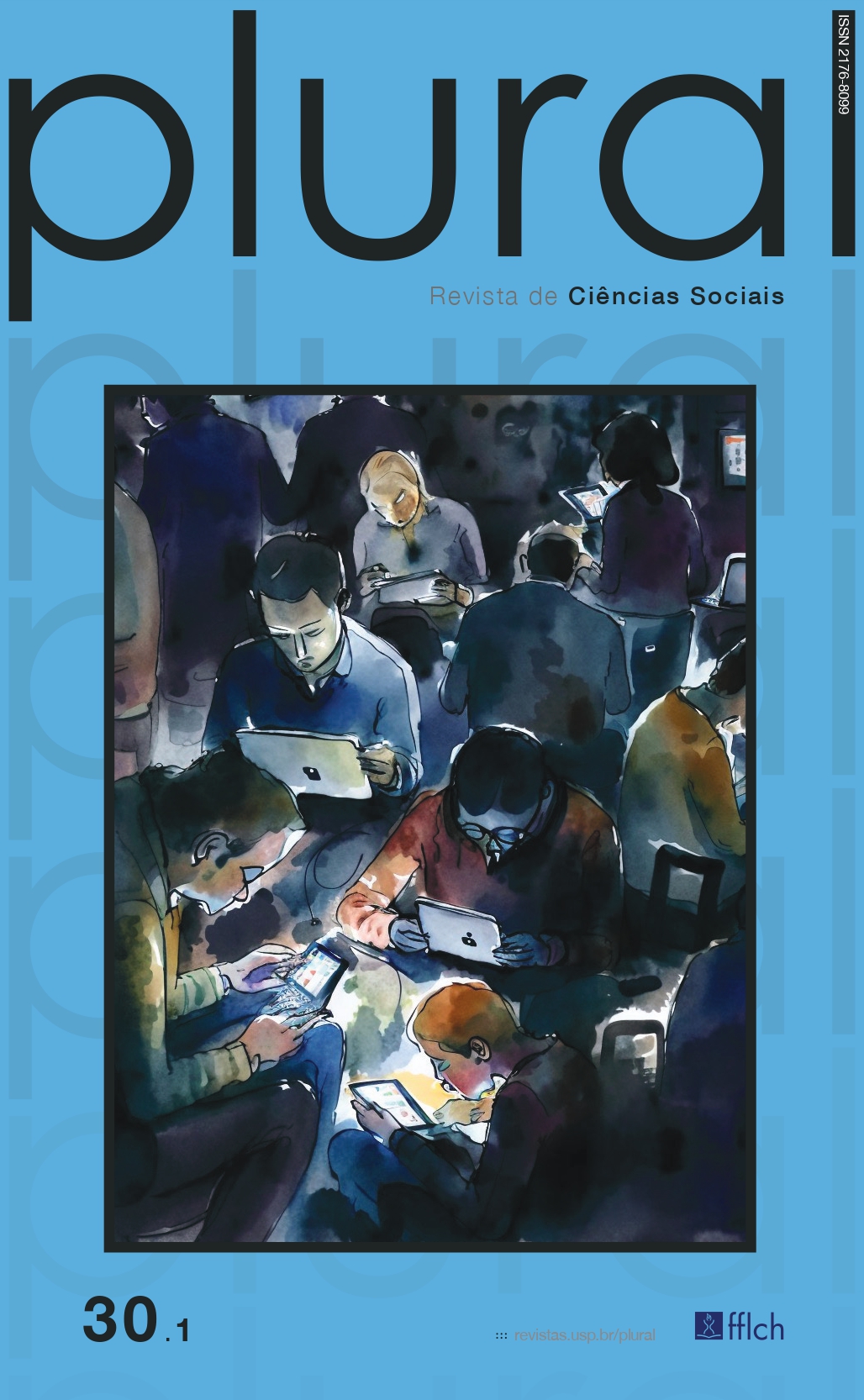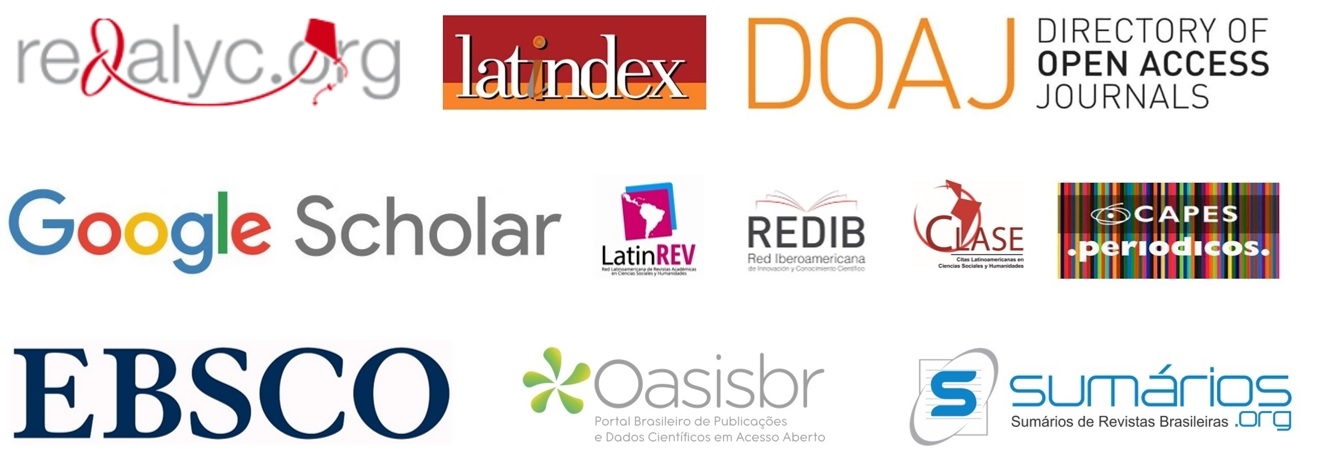Sugar babies are companies and sugar daddies are angel investors: an analysis of sugar relationships and their links with elements of a neoliberal rationality
DOI:
https://doi.org/10.11606/issn.2176-8099.pcso.2023.205473Keywords:
Sugar relationships, Dating sites, Digital media, Neoliberal rationality, DifferencesAbstract
Heterosexual sugar relationships consist of sugar daddies and sugar babies. Financial support is an essential factor in these configurations since they presuppose scenarios in which a sugar daddy bears the financial expenses and consumption aspirations of a sugar baby, according to the negotiations that both make with each other during the bond. Mostly, these people meet through dating sites that promise to connect them. This article presents an analysis of differences, such as those of gender, age, and race, and of a neoliberal rationale in sugar relationships, expressing the path of an ethnography carried out in digital contexts that collected and analyzed the following data: 1) Profiles of sugar babies on a sugar dating site; 2) Interviews with sugar babies; 3) Publications of the site in its digital dissemination channels. In general, it appears that these relationships are configured through social hierarchies based on gender, class and racial inequalities, and the operability of a neoliberal rationality is visualized, which inculcates self-entrepreneurship in this environment as a fundamental condition for the encounter of the ideal pair.
Downloads
References
ABÍLIO, Ludmila.; AMORIM, Henrique.; GROHMANN, Rafael (2021). Uberização e plataformização do trabalho no Brasil: conceitos, processos e formas. Sociologias, Porto Alegre, ano 23, n. 57, p. 26-56. https://doi.org/10.1590/15174522-116484
ADELMAN, Miriam (2011). Por amor ou por dinheiro? Emoções, discursos, mercados. Contemporânea: Revista de Sociologia da UFSCar, São Carlos, v. 1, n. 2, p. 117-38. https://www.contemporanea.ufscar.br/index.php/contemporanea/article/view/43 (acesso em 18/04/2023).
BATISTA, Paulo Nogueira (2009). “O consenso de e a visão neoliberal dos problemas latino-americanos”. In: BATISTA JÚNIOR, Paulo Nogueira (org.). Paulo Nogueira Batista: pensando o Brasil: ensaios e palestras. Brasília: Fundação Alexandre de Gusmão, p. 115-62.
BAYM, Nancy (2011). “Social Networks 2.0”. In: CONSALVO, Mia.; ESS, Charles (orgs.). The handbook of internet studies. Hoboken: Wiley-Blackwell, p. 384-405.
BAYM, Nancy (2015). Personal connections in the digital age. Cambridge: Polity Press.
CABANAS, Edgar; ILLOUZ, Eva (2022). Happycracia: fabricando cidadãos felizes. São Paulo: Ubu Editora.
CAMINHAS, Lorena Rúbia Pereira (2021). Webcamming erótico comercial: nova face dos mercados do sexo nacionais. Revista de Antropologia, São Paulo, v. 64, n. 1, e184482, p. 1-22. http://dx.doi.org/10.11606/1678-9857.ra.2021.184482
DARDOT, Pierre; LAVAL, Christian (2016). A nova razão do mundo: ensaio sobre a sociedade neoliberal. São Paulo: Boitempo Editorial.
GUNNARSSON, Lena.; STRID, Sofia (2022). Chemistry or service? Sugar daddies’ (re)quest for mutuality within the confines of commercial exchange. The Journal of Sex Research, v. 59, n. 3, p. 309-320. https://doi.org/10.1080/00224499.2021.1952155
GUNNARSSON, Lena.; STRID, Sofia (2021). Varieties of sugar dating in Sweden: content, compensation, motivations. Social Problems, spab063. https://doi.org/10.1093/socpro/spab063
HARVEY, David (1992). Condição Pós-Moderna: uma pesquisa sobre as origens da mudança cultural. São Paulo: Edições Loyola.
HINE, Christine (2015). Ethnography for the internet: embedded, embodied and everyday. London: Bloomsbury Academic Publishing.
ILLOUZ, Eva (2007). Cold intimacies: the making of emotional capitalism. Cambridge: Polity Press.
ILLOUZ, Eva (1997). Consuming the romantic utopia: love and the cultural contradictions of capitalism. Berkeley: University of California Press.
ILLOUZ, Eva (2014). Hard romance: Cinquante Nuances de Grey et nous. Paris: Éditions du Seuil.
ILLOUZ, Eva (2003). Oprah Winfrey and the glamour of misery: an essay on popular culture. New York: Columbia University Press.
ILLOUZ, Eva (2019). The end of love: a sociology of negative relations. Oxford: Oxford University Press.
LOVELUCK, Benjamin (2018). Redes, liberdades e controle: uma genealogia política da internet. Petrópolis: Vozes.
MACKENZIE, Donald; WAJCMAN, Judy (1999). “Introductory essay: the social shaping of technology”. In: MACKENZIE, Donald; WAJCMAN, Judy. The social shaping of technology. Philadelphia: Open University Press, p. 3-27.
MILLER, Daniel; HORST, Heather (2015). O Digital e o Humano: prospecto para uma Antropologia Digital. Parágrafo, São Paulo, v. 2, n. 3, p. 91-111. https://revistaseletronicas.fiamfaam.br/index.php/recicofi/article/view/334 (acesso em 18/04/2023).
MISKOLCI, Richard (2021). Batalhas morais: política identitária na esfera pública técnico-midiatizada. Belo Horizonte: Autêntica.
MISKOLCI, Richard (2017). Desejos digitais: uma análise sociológica da busca por parceiros on-line. Belo Horizonte: Autêntica.
NAYAR, Kavita Ilona (2017). Sweetening the deal: dating for compensation in the digital age. Journal of Gender Studies, v. 26, n. 3, p. 335-346. http://dx.doi.org/10.1080/09589236.2016.1273101
PELÚCIO, Larissa (2019). Amor em tempos de aplicativos: masculinidades heterossexuais e a nova economia do desejo. São Paulo: Annablume.
PELÚCIO, Larissa (2022). A uberização do amor - aplicativos de encontros em cenário tecnoliberal e pandêmico. Revista TOMO, Sergipe, n. 41, p. 199-232. https://doi.org/10.21669/tomo.vi41.17480
PISCITELLI, Adriana; et al (2011). Gênero, sexo, amor e dinheiro: mobilidades transnacionais envolvendo o Brasil. Campinas: UNICAMP/PAGU.
PISCTELLI, Adriana (2010). “Gringas ricas”: viagens sexuais de mulheres europeias no Nordeste do Brasil. Revista de Antropologia, São Paulo, v. 53, n. 1, p. 79-115. https://doi.org/10.1590/S0034-77012010000100003
SADIN, Éric (2016). Silicolonisation du monde: l’irrésistible expansion du libéralisme numérique. Le Kremlin-Bicêtre: L’échappée.
SCHRADIE, Jen (2017). Ideologia do Vale do Silício e desigualdade de classe: um imposto virtual em relação à política digital. Parágrafo, São Paulo v. 5, n. 1, p. 85-99. https://revistaseletronicas.fiamfaam.br/index.php/recicofi/article/view/564 (acesso em 18/04/2023).
SCULL, Maren (2020). “It’s its own thing”: a typology of interpersonal sugar relationships scripts. Sociological Perspectives, v. 63, n. 1, p. 135-58. https://doi.org/10.1177/0731121419875115
SCULL, Maren (2022). Sugaring as a deviant career: modes of entering sugar relationships and social stigmas. Deviant Behavior, v. 43, n. 12, p. 1-23. https://doi.org/10.1080/01639625.2022.2061391
SEGATA, Jean; RIFIOTIS, Theophilos (2021). Digitalização e dataficação da vida. CIVITAS: revista de Ciências Sociais, v. 21, n. 2, p. 186-92. https://doi.org/10.15448/1984-7289.2021.2.40987
SILVA, Caroline Rodrigues (2020). As sugar babies e os relacionamentos afetivos monetários: a (res) significação da atividade do sexo a partir do mundo sugar. Dissertação (mestrado). Vitória: Universidade Federal do Espírito Santo.
UPADHYAY, Srushti (2021). Sugaring: understanding the world of sugar daddies and sugar babies. The Journal of Sex Research, v. 58, n. 6, p. 775-84. https://doi.org/10.1080/00224499.2020.1867700
WEBER, Max (1982). “Rejeições religiosas do mundo e suas direções”. In: GERTH, Hans.; MILLS, Charles Wright (orgs.). Ensaios de Sociologia. Rio de Janeiro: Guanabara, p. 371-410.
ZELIZER, Viviana (2005). The purchase of intimacy. Princeton: Princeton University Press.
ZELIZER, Viviana (2009). Dinheiro, poder e sexo. Cadernos Pagu, [S. l.], n. 32, p. 135–57. https://www.scielo.br/j/cpa/a/vxhJpXpdCxhYZYKGn8yRnLS/?format=pdf&lang=pt (acesso em 18/04/2023).
ZUBOFF, Shoshana (2019). The age of suveillance capitalism: the fight for a human future at the new frontier of power. New York: PublicAffairs.
Downloads
Published
Issue
Section
License
Copyright (c) 2023 Política de direitos compartilhados

This work is licensed under a Creative Commons Attribution-NonCommercial-ShareAlike 4.0 International License.
Ao submeter seu trabalho à Plural, o autor concorda que: o envio de originais à revista implica autorização para publicação e divulgação, ficando acordado que não serão pagos direitos autorais de nenhuma espécie. Uma vez publicados os textos, a Plural se reserva todos os direitos autorais, inclusive os de tradução, permitindo sua posterior reprodução como transcrição e com devida citação de fonte. O conteúdo do periódico será disponibilizado com licença livre, Creative Commons - Atribuição NãoComercial- CompartilhaIgual –, o que quer dizer que os artigos podem ser adaptados, copiados e distribuídos, desde que o autor seja citado, que não se faça uso comercial da obra em questão e que sejam distribuídos sob a mesma licença (ver: http://www.creativecommons.org.br/).Funding data
-
Fundação de Amparo à Pesquisa do Estado de São Paulo
Grant numbers 2021/14306-0








